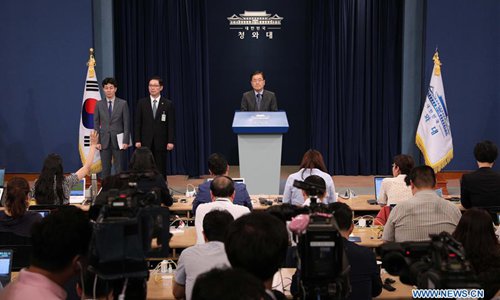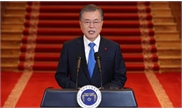South Korea, US show differences over Japan’s Fukushima water plans

Chung Eui-yong (C), South Korean President Moon Jae-in's top national security adviser, attends a press briefing in Seoul, South Korea, on Sept. 6, 2018. Chung said the two Koreas agreed to hold the third Moon-Kim summit in the Democratic People's Republic of Korea (DPRK)'s capital city on Sept. 18-20. (Xinhua/Newsis)
South Korea raised concerns over Japan's decision to dump nuclear-contaminated water from Fukushima nuclear power plant into the sea with visiting US climate envoy John Kerry, its foreign ministry said, but Kerry reaffirmed Washington's confidence in the plan's transparency.
Kerry arrived in Seoul on Saturday to discuss international efforts to tackle global warming on a trip ahead of US President Joe Biden's virtual summit with world leaders on climate change on April 22 and 23. South Korean Foreign Minister Chung Eui-yong sought to rally support behind the country's protest against the Fukushima plan at a dinner meeting with Kerry, the ministry said.
Under the plan, more than 1 million tons of nuclear-contaminated water will be dumped from the plant wrecked by an earthquake and tsunami in 2011 into the nearby sea off Japan's east coast. Seoul strongly rebuked the decision, with the foreign ministry summoning the Japanese ambassador and President Moon Jae-in ordering officials to explore petitioning an international court.
"Minister Chung conveyed our government and people's serious concerns about Japan's decision, and asked the US side to take interest and cooperate so that Japan will provide information in a more transparent and speedy manner," the ministry said in a statement.
But Kerry, at a media roundtable on Sunday, said Tokyo had made the decision in a transparent manner and will continue following due procedures. The former US secretary of state added that Washington would closely monitor Japan's implementation "like every country, to make certain there is no public health threat."
The South Korean foreign ministry said Chung and Kerry also agreed to work together to boost international cooperation to achieve carbon neutrality by 2050, a goal pledged by South Korea, Europe and others.

